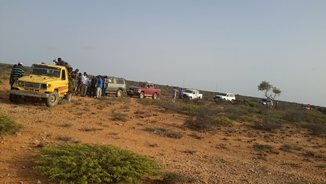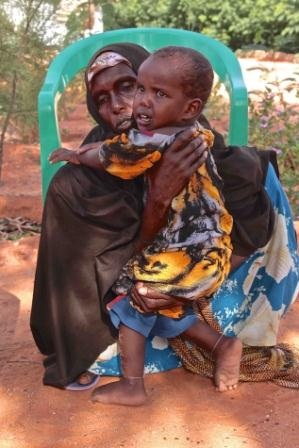 The Puntland Health Ministry/UN agency convoy on the road to Jariban district to investigate the polio outbreak @UNICEF Somalia/20147 August 2014 - UN agencies in Somalia combined forces once again to help a joint UNICEF and WHO team to visit a remote district of Puntland in north east Somalia where four people have contracted polio this year.
The Puntland Health Ministry/UN agency convoy on the road to Jariban district to investigate the polio outbreak @UNICEF Somalia/20147 August 2014 - UN agencies in Somalia combined forces once again to help a joint UNICEF and WHO team to visit a remote district of Puntland in north east Somalia where four people have contracted polio this year.
The victims - a young father who died and three children who were paralysed – all came from Jariban district - a long drive on a dusty track from the nearest main town Galkayo, in an area known for pirates and armed gangs. As these were the only four polio cases in Somalia so far this year, it was essential to visit the area to discover how the virus got there and how to stop it spreading further. However the terrain, distance, logistics and above all security concerns made it an extremely challenging proposition.
The solution was found, once again, through another example of close cooperation across agency boundaries. The joint Puntland Health Ministry, UNICEF and WHO mission was given full support by the UN Special Representative for Somalia Nicholas Kay and the UN’s Humanitarian Coordinator Philippe Lazzarini. Two helicopters were approved for the trip but could not be used due to refuelling requirements, so, with the help of staff from other UN entities, including the Office of the High Commissioner for Refugees (UNHCR), the Department of Safety and Security (DSS) and the Office for the Coordination of Humanitarian Affairs (OCHA), a complicated road mission was arranged.
‘The way in which UN agencies quickly offered substantive support for this important trip is an excellent example of how the UN family is working as one to improve the lives of Somalis,’ said the UN Humanitarian Coordinator Philippe Lazzarini. ‘Everyone is only too aware of the terrible threat posed by the reoccurrence of polio in Somalia and determined to ensure the country becomes polio free once again as soon as possible.’
Those taking part in the visit included the Governor of Mudug region and Puntland’s State Minister of Health, local and international staff from UNICEF and WHO, with support staff from UNHCR and OCHA. The convoy, which had a heavily armed escort, also included two trucks of supplies from UNICEF, WHO and OCHA.
 Two year old Asha Mohamed from Jariban District was the first case of polio in Somalia in 2014. When she became unable to walk her distraught mother brought her to Galkayo. @UNICEF Somalia/2014/Makundi‘This mission showed the commitment of the humanitarian community to support the polio programme, to come together and make a difference,’ said Dr Ghulam Popal, WHO Somalia Representative.
Two year old Asha Mohamed from Jariban District was the first case of polio in Somalia in 2014. When she became unable to walk her distraught mother brought her to Galkayo. @UNICEF Somalia/2014/Makundi‘This mission showed the commitment of the humanitarian community to support the polio programme, to come together and make a difference,’ said Dr Ghulam Popal, WHO Somalia Representative.
‘We had the highest commitment from the Puntland Government and very much appreciated their participation,’ said Dr Dhananjoy Gupta, Polio Team Leader, UNICEF Somalia. ‘This was the first visit by the UN or the Government to this area for a very long time.’
The convoy set off on at dawn on 22 July and drove seven hours from Galkayo to Jariban town, the main centre in Jariban district, where the team met a group of elders to discuss the outbreak and raise awareness. The town has only one maternal and child health clinic run by the Red Crescent Society but no hospital or other facilities. The next day they drove another three hours to Towfiq village where they visited the family of the 29 year old man who had died after contracting polio.
‘This was a very sad visit – the man’s wife said she and their five children had been vaccinated but he had not. He was the only breadwinner in the family,’ said Dr Abraham Mulugeta, WHO Somalia’s Polio Team Leader.
The three children who were paralysed by polio this year live in villages near Towfiq that are only accessible on foot, so the team could not visit them. Experts had already seen one of the children, Asha, who was earlier brought by her mother to Galkayo.
The first case of polio in Somalia for six years was discovered in Mogadishu in May 2013 – and in total 198 people - mostly children – have been affected by the virus. The Somali authorities, supported by UNICEF and WHO, have carried out regular nationwide vaccination campaigns and the only four cases reported in 2014 have all been in Jariban district.
While in Towfiq, which has no health facility, the team watched the door to door vaccination campaign for children – the third round of vaccinations since the outbreak was discovered in the area in May this year. There is another campaign in August in the whole of Mudug region and surrounding areas, for adults as well as children.
On the way back the team held a community meeting in Bula Busle and identified a suitable landing strip for small aircraft near Jariban to provide UN agencies with easier access to the area.
‘This trip showed the real obstacles and challenges to reaching every last child in Somalia, and creative ways the UN can use to overcome them,’ said the Acting Representative for UNICEF Somalia, Foroogh Foyouzat. ‘Polio is a major challenge for us but we must keep up the pace until we are certain that polio is eliminated from Somalia and not another single child or adult will be paralysed or die from the virus. ‘
For more information please contact:
Dr Dhananjoy Gupta
UNICEF Somalia Polio Team Leader
Cette adresse email est protégée contre les robots des spammeurs, vous devez activer Javascript pour la voir.
+254-20-76 28575 : +254 -705-194113
Dr Abraham Mulugeta Debesay
WHO Somalia Polio Team Leader
Cette adresse email est protégée contre les robots des spammeurs, vous devez activer Javascript pour la voir.
+254 -733-770192



